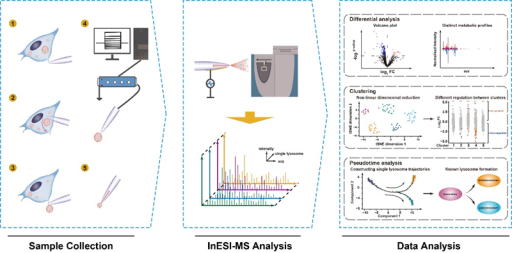


In a study published in Nature Methods, a team led by Prof. XIONG Wei and Prof. CANG Chunlei from University of Science and Technology of China realized lysosome typing for the first time based on single lysosome metabonomic information by establishing a single lysosome metabonomic mass spectrometry detection technology, and explored the heterogeneity changes of lysosome metabonomics in the process of cellular senescence.
Lysosomes are organelles present in almost all eukaryotic cells. They are essential for maintaining energy and metabolic homeostasis, signal transduction, and the recovery of damaged proteins and organelles. Previous studies indicated that cellular senescence is closely related to lysosomes and their internal metabolic processes.
There exists a variety of lysosomes in a single cell, such as autophagy lysosome and endolysosome. Studying the specificity of different types of lysosomes in the process of aging can provide new approaches for the development of drug targets for anti-aging and the treatment of aging related diseases. Due to technical limitations, it is not possible to detect single lysosome metabonomics, let alone to study cell aging from the perspective of single lysosome metabonomics.
The researchers in this study established the single lysosomal mass spectrometry platform based on single lysosome patch and ultra-low speed induction electrospray ionization mass spectrometry. The platform realized the detection of metabolites directly without any pretreatment in cells, and more accurately retained the information of metabolites in lysosomes.
They then conducted in-depth research on the metabolic heterogeneity of various types of lysosomes in the process of cell aging on the platform.

ANALYSIS PLATFORM OF SINGLE LYSOSOME METABONOMICS (Image by ZHU Hongying)
Based on the single lysosome metabonomics, lysosomes from at least four cell sources were divided into five subgroups, including endocytic lysosomes and autophagic lysosomes and metabolic changes of various lysosomes in the aging process are studied. The researchers analyzed the metabolic changes of the five lysosomal subsets in the aging process, and found that the metabonomics changes of each type of lysosomal subsets were different.
This study indicates that there exists lysosome type specificity in the changes of lysosome metabolism in the process of cell aging.
Paper link: https://www.nature.com/articles/s41592-021-01182-8
(Written by WENG Jingwen, edited by LU Hongyu, USTC News Center)
 Back
Back